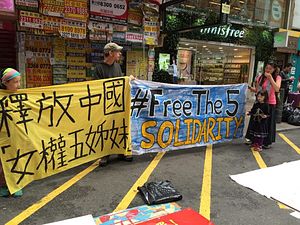On March 7 (the day before International Women’s Day), five activists for women’s rights were detained in China. Wei Tingting, Wang Man, Wu Rongrong, Li Tingting and Zheng Churan, all members of China’s Women’s Rights Action Group, had planned to pass out fliers denouncing sexual harassment; for that, they were detained on charges of “picking quarrels and provoking troubles.”
Now, after an international outcry, the five women are free on bail. One of the women’s lawyers, Liang Xiaojun, told the New York Times that prosecutors had decided not to press charges – at least not immediately. The women are still under investigation and, in the meantime, will remain under police monitoring. However, experts believe it’s unlikely they will be formally charged at this point.
As Sarah Cook of Freedom House argued in a recent piece for The Diplomat, the women’s detention was not truly surprising. Beijing has stepped up its bid to control social expression in China, both online and in the real world, since Xi Jinping assumed power in late 2012. Forms of expression previously tolerated in China suddenly became taboo — Uyghur professor Ilham Tohti, largely viewed as a moderate, wound up in jail, environmental protests have been broken up with force, and now feminist activists are subject to imprisonment.
Against that backdrop, the real question is not why the authorities arrested the five women, but why they were released. International activists are already hailing the women’s release as a victory for the various social media campaigns to win their freedom (for example, #freethefive on Twitter). Protestors in Hong Kong and outside of Chinese embassies took the message offline and into the real world.
Politicians joined in as well; former U.S. Secretary of State (and the favorite to be the Democratic candidate for president in 2016) Hillary Clinton tweeted her support, while current Secretary of State John Kerry issued a formal statement calling for China to “immediately and unconditionally release” the women.
However, Beijing in general turns a deaf ear to foreign outrage over alleged human rights violations. An international outcry didn’t stop the conviction of Ilham Tohti on charges of separatism and Nobel Peace Prize winner Liu Xiaobo remains in prison. In fact, China often calculates that responding to international criticisms will only mean more criticisms later – if one series of protests is successful, Beijing’s critics will try the same tactics again.
Sure enough, international human rights group are hailing the release of the “Beijing Five” as a victory for their efforts to draw attention to the case. William Nee of Amnesty International called the women’s release “an encouraging breakthrough.” Maya Wang of Human Rights Watch said that “the release is the result of unprecedented international pressure.” Even one of the women’s lawyers told Sky News he wanted “to thank the whole world for their support. Their release can’t be separated from the effort from all the feminist groups all around the world, all the politicians and organizations.”
The idea of caving to international criticism of its human rights record is generally anathema to Beijing. The last thing China wants is to seem susceptible to foreign pressure. So what made this case different?
It’s impossible to know exactly what calculations were made before deciding to release the women, but it seems likely that Beijing’s recent push for the “rule of law” was at least a partial factor. Though China will not be divesting the legal system from Party control, it does want to reduce the ability of local officials to interfere in the justice system. Beijing also wants to promote the image of an impartial justice system, to restore public confidence in courts seen as corrupt and unjust.
Releasing the women on bail while further investigations are carried out allows Beijing to point to a high-profile example of its legal system in action. As the families of the women put it in a letter to prosecutors, “We believe the case of the five young women is a great opportunity for the Haidian District People’s Procuratorate to show our independent and fair judicial system to the country and the world.”
Meanwhile, human rights activists also argue that the domestic response from within China may have been more important in Beijing’s calculus than the international outcry. Feminists have generally been largely immune from political persecution. The women’s families argued in their letter that “[a]ctivities to oppose sexual harassment promote the knowledge of the law and are in line with the spirit of the criminal law, with our law for the protection of women and children and with the core values of socialism.”
The detention of five women for raising awareness of sexual harassment risked “politicizing” young women around China, according to Wang Zheng, a professor of women’s studies at the University of Michigan. “This generation grew up in the last 20 and 30 years, most of them not keen on politics. But they are being politicized by this event,” Wang told ChinaChange.org.
It’s likely that no one factor led to the release of the five women. Each single one — international pressure, appeals to China’s justice system, and domestic frustration — has been brought to bear before with no success. But the combination of all three may have been enough to tip the scales in the women’s favor.

































